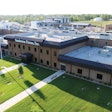Baader Linco, a global supplier of poultry processing equipment, partnered with Auburn University’s Poultry Science Department in 2017. In conjunction with key members of the university, Baader Linco tested its newly developed above-ground controlled atmosphere stunning system. Baader Linco further strengthened its partnership by donating the $750,000 system to Auburn University and the Charles C. Miller Jr. Poultry Research and Education Center in early October.
Baader Linco’s stunning system will be installed in the Miller Center’s new poultry processing plant once construction is complete in 2019. Until then, the equipment is located at the existing poultry research farm off South College Street. Auburn’s poultry scientists and welfare experts collaborated with Baader Linco’s engineers to develop and perfect the O 2 and CO 2 mixture within the system.
Baader Linco CEO, Oliver Hahn, said Auburn University was not selected randomly, “Baader Linco recognizes the Department of Poultry Science at Auburn University as a leading authority in the research and science of poultry technology. With great dedication to animal welfare standards, we partnered our high-quality, industry-focused engineering team with the experts in poultry science at Auburn.”
Assistant Professor and Extension Specialist of Poultry Science at Auburn University, Dr. Diana Bourassa, has led the collaborative research with her expertise in animal welfare.
“So far, my research has involved validating the system for use, including adjusting parameters to maximize bird welfare,” Dr. Bourassa said. In addition, she and fellow Auburn poultry scientist Dr. Jessica Starkey have begun testing the physiological characteristics of poultry processed using gas stunning versus electrical stunning.
Stunning is a standard procedure that humanely renders birds unconscious prior to slaughter. Electrical stunning is by far the most widely used system in the U.S. Birds are caught, shackled and exposed to a mild electrical current until they lose consciousness. Controlled atmosphere stunning, or CAS, conveys birds through successive chambers and exposes them to O 2 with increasing concentrations of CO 2 that renders them insensible.
Both methods are humane and approved for use by the USDA; however, CAS eliminates the shackling of conscious birds improving animal welfare, processing conditions, and meat quality.
While other equipment manufacturers also offer above-ground CAS systems, Baader Linco’s models differ in several key properties, including how the gas mixture enters the system.
Only a small percentage of processors in the U.S. currently use a CAS system, however, Dr. Bourassa predicted it will soon become the predominant stunning method.
According to Dr. Bourassa, “through public policy statements, at least 101 companies that buy chicken, such as Aramark, Campbell Soups and Jack’s, have pledged to require that the products they purchase be stunned using CAS systems by 2024, and Perdue Farms has committed to converting all of their processing facilities to CAS systems.”
Auburn University’s Poultry Science Department Head and Professor, Dr. Don Conner, said the equipment donation to the Miller Center will be the only one of its kind for a university.
“With this system, Auburn will lead the way on research assessing the impact of carbon dioxide CAS systems on birds’ physiological responses and potential impacts on animal welfare,” Dr. Conner said. “We will also be able to provide hands-on education for both undergraduate and graduate students as well as industry professionals. The knowledge and understanding of the methods we use to convert animals into food is critical in a day and age where so much misinformation and misunderstanding exists.”
Mr. Hahn commended Auburn University’s commitment and investment in establishing the Miller Center, “we believe that the sustainable-resource-sensitive future of the poultry industry lies in the synergy among all facets, e.g. poultry breeders, producers, feed suppliers, equipment manufacturers and the research community. We proudly support and encourage the growth of this state-of-the-art facility as an essential part to the future of the industry.”

















